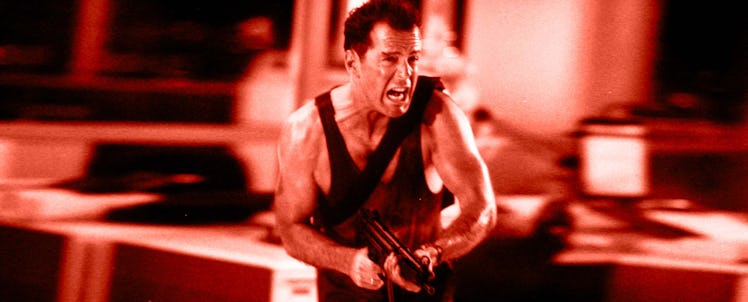My Son Won’t Let Me Forget About ‘Die Hard’
When he was young, I didn't let him watch it with some friends. Years later, when he recounted the story, how he remembered it taught me a lot.

When I realized I was a character in my son’s story, I held my breath, waiting to see what kind of person I’d become.
Let me explain. My wife and I were in an audience of teenagers and their parents and teachers, in an auditorium outside Washington DC. On stage, our eldest son — a novelist and a social activist, invited here to speak about the issues he addresses in his books — urged his audience to live their values. “It can be hard to stand up for what you know is right,” he said.
Then he strode to the front of the stage and said: “Let me tell you a story.”
This story was submitted by a Fatherly reader. Opinions expressed in the story do not necessarily reflect the opinions of Fatherly as a publication. The fact that we’re printing the story does, however, reflect a belief that it is an interesting and worthwhile read.
He recounted to the audience a lesson he had learned from his father. When he was in elementary school, my son said, his family spent New Year’s Eve in a hotel in Boston. Two other families from their neighborhood booked adjacent rooms in the hotel. The three families convened to participate in the parades and music and entertainments that marked Boston’s annual New Year festival. The children of the three families were about the same age and some of them were friends.
Late in the evening, the families retreated from the cold streets to their hotel to warm up and continue the party. All the children gathered in one family’s room. A parent decided to rent an in-room movie on the television for the children to watch. The chosen film was a new release, Die Hard and it was rated R.
“I was ten years old,” my son said. “My brother was five. My parents did not let us watch films rated for older audiences. They didn’t that night, either.”
He put his audience in his pre-adolescent shoes by describing how he felt to be separated from the other children, not allowed to enjoy the rest of the evening with the pack. He had the audience feel his bafflement, his embarrassment before his friends, his anger, the tears. Then he asked the audience to change shoes. Now they were adults, feeling the pressure his father had felt to conform to the moment, not just to placate his caterwauling son, but also to avoid the awkward breech with the other parents—“his friends.”
“But he stuck to his values,” he told the audience. “He didn’t just go along to get along, and that was a valuable lesson for me.”
My son is a gifted teacher. Like all good teachers, he knows how to turn in a performance — witness the tears running down the cheeks of his proud parents as they listened to him. His story — like his four novels — was constructed and delivered masterfully. But when he capped the story to move on to the next section of his argument, I became distracted. The man he had cast as his father in his story was unfamiliar to me.
What my son told was a tale of his experience that evening, and the lesson he took from it, looking back as an adult. But when I look back on that evening, I remember a different experience. I remember doubting myself, wavering, second-guessing.
When we herded our children out of our neighbor’s hotel room, my son bolted and ran. I chased after him and convinced him to sit with me in the busy hotel lobby to hear me out. I tried to carefully explain why I believed a child his age was simply too young to appropriately process the intense violence of that movie. I carefully argued the reasoning behind the principle.
But I was trying to convince myself, as much as him, that I wasn’t simply being a jerk. I was heart-broken by his fury—I knew how he felt, and I sympathized. I ran a zigzaging mile through my thoughts, searching for some way to make this up to him. To repair the cost a principle exacts.
That night I slept poorly. I played back in my head, over and over, every step leading up to the poor decision an adult made to choose that movie, hoping to find a moment earlier in the evening that I could re-live and change, so that we would never get to where we were. I was angry with my neighbors for instigating this scene. (The two other fathers had conspired to park the kids in front of a television so that they could return outside to amuse themselves.) And I was as furious with myself as my son was, and for pretty much the same reason.
I stood fast to a principle I had about parenting. We both remember that. The rest is different. My son remembers a father who believed in values and lived them. I remember someone far less upright, far more conflicted. He remembers an incident that gave him a model to shape his soul around. I remember one of those elevating moments of parenting, when we adults behave as people better than who we actually are.
There was something mythic about the father in my son’s story. Maybe all fathers are a little mythic to their sons. Now a father himself, I think my son is beginning to sense that. Both of us admire the man in the story. And I pray that on our best days we can resemble him a little.
Thomas Kiely is retired from the consulting industry. He lives north of Boston, avoids air travel, and reports to his new bosses – his grandchildren.